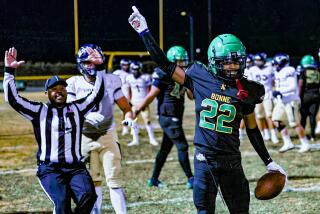Northeast Louisiana Feels Like Scapegoat
- Share via
Since 1952, when it began keeping count, the NCAA has issued 300 reprimands or sanctions against Division I schools for rules infractions. Until recently, all of those actions were against men’s teams or athletes.
Northeast Louisiana isn’t exactly thrilled about the precedent it set when its women’s basketball team became the first female program to feel the wrath of collegiate sports’ police force.
Northeast, which had the nation’s best record at 30-2 last season, was placed on a one-year probation for illegally recruiting 6-foot-4 sophomore star Chana Perry. In addition to barring the school from the postseason tournament--the Lady Indians reached the Final Four last year--Perry was declared ineligible for the remainder of the season and Coach Linda Harper was prohibited from recruiting off campus for one year.
According to Frank J. Remington, chairman of the NCAA committee on infractions, six violations had occurred, including providing illegal auto transportation and one night’s lodging for Perry, lending her a wristwatch and allowing her to shoot baskets in the school’s gym with an assistant coach watching.
More serious, Remington said, was the allegedly false and misleading information reported to the NCAA during its investigation, by an assistant coach who has since been fired.
What Northeast wonders, however, is whether the punishment fits this particular crime.
“I certainly feel in light of the violations that occurred, which were isolated situations, and when you consider some of the past cases the NCAA has had to deal with, the penalties were harsh and stiff,” Harper said. “I don’t know why that is, but there are rumors.”
The rumors are that the NCAA hung Northeast out to dry in the noonday sun as an example to other women’s sports programs--a signal that punishment would be swift and significant if it discovers misdemeanors, that it will not allow women’s sports to become overrun with scandals, mirroring the condition of many men’s programs.
Dr. Dwight Vines, president of the school, does not appreciate the role of scapegoat. He can be excused if he feels a little like the fictional fugitive Jean Valjean in “Les Miserables,” a starving man who was pursued relentlessly through the streets of Paris for stealing a loaf of bread.
“You can divide infractions into major and minor,” Vines said. “All of ours were distinctly minor, so minor, in fact, that they were ridiculous. We don’t live and die with athletics here. There is no pressure from alumni and there is no motive for us to buy players. With excesses that are apparent in collegiate sports today, players getting under-the-table payments, for the NCAA to fool with these trivial things seems absurd.”
As an example, Vines cited the basket-shooting violation, which the NCAA viewed as an illegal tryout for Perry. “The gym was dark,” he said. “She was just killing time. You don’t try out the No. 1 girl in the nation in a darkened gym. That’s absurd, to call that a tryout.
“And the wristwatch, a used one worth maybe $50 or $75. It was returned after a week. What’s the value of a week’s use of a used watch? Two dollars?
“We have three All-American players here. I asked the coach, ‘Do any of them have automobiles?’ She said, ‘No, sir.’ I asked, ‘Do any of them have stereos?’ She said, ‘No, sir.’
“I challenge you to find three All-Americas at any other program without automobiles and without stereos. If we were doing big-time cheating, it would be reflected in cars, stereos, clothes. Big-time cheating is done by professional people who are difficult to catch. We were easy to catch,” Vines said.
That’s especially true because the NCAA rules are so easy to break. The manual published by the folks in Mission, Kan., which details what you can and can’t do, is 380 pages.
“I’m sure in any program at this institution, you could find minor infractions,” Vines said. “And that’s true of anybody’s program at any institution. Normally, they don’t bother you, unless you recruit the No. 1 player.
“Dishonesty is the worst problem we have in college athletics. Intercollegiate athletics in this country don’t have much credibility. The simplest way out of that is not more rules, but better rules.”
The manual has both varieties.
“There are so many rules,” Harper said. “What I find difficult are the different interpretations of the rules. It gets so nobody’s sure what they mean. You get different interpretations for different situations. That part is difficult. But the rules are there and whether we agree or disagree with them, we must abide by them.”
The person who didn’t abide at Northeast, according to Vines, was Joy Shamburger, whom he described as “a young graduate assistant, who was unaware of the rules. That’s our fault, that she was not supervised more closely.”
Shamburger was dismissed by the university last May. By then, however, the damage had been done, including the NCAA’s charge that she wasn’t completely candid during its investigation.
“But we had no idea we would be penalized like this. We are just flabbergasted,” Vines said.
At first, Northeast intended to appeal the sanctions. Then it backed off because, Vines said, “We don’t want to antagonize the NCAA.”
The school’s position may also have been affected by the knowledge that the NCAA Council has never reversed a penalty on appeal. Another factor is the attempt to get Perry reinstated and declared eligible. That effort is continuing. So is the Northeast basketball team. Entering the weekend, the Lady Indians were 9-2 for the season, 2-0 since the probation announcement was made.
More to Read
Go beyond the scoreboard
Get the latest on L.A.'s teams in the daily Sports Report newsletter.
You may occasionally receive promotional content from the Los Angeles Times.










